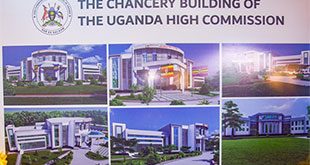
By Ronald Musoke
Chrysostom Muyingo, the state minister for higher education has said his ministry is in the final stages of working on a policy that will compel schools across the country to have teachers dedicated to mentoring, counselling and giving career guidance to secondary school students.
He said having dedicated mentors at school would solve the problem of ‘chaos and strikes’ in schools that have become rampant in the country.
Muyingo who on Aug. 15 was opening a headteachers’ school leadership forum under the MasterCard Foundation Scholarship scheme in Kampala said the reason why schools like Mt. St Mary’s Namagunga—one of the oldest and missionary-founded schools in the country— are very peaceful is largely because of their strong mentorship programme that they have cultivated over decades.
Scores of schools were forced to temporarily close in 2013 as students went on rampage destroying school property as a way of registering their dissatisfaction with their schools’ mal-administration.
Sheema District came off worse and in mid-2013, the education ministry was forced to close over 40 schools as a measure to deal with the unprecedented problem.
“Having a teacher prepared to mentor, counsel or offer career guidance is good because these teachers always know what is going on around the school and they know the students well,” Muyingo said.
Muyingo appealed to all headteachers to come up with initiatives which will enable students to be nurtured into useful citizens and leaders in society.
By doing this, it would be a great service to Uganda, he said.
“Whenever I think about the corruption going on in this country, the blame always comes back to us teachers because these children are given to us to mould them into good citizens,” said Muyingo who is also a professional teacher.
The $47m (Sh 117.5b) scholarship programme which has been running since 2012 will continue until 2020 and will enable up to 5000 young Ugandans from economically disadvantaged backgrounds, complete quality secondary education and transition into tertiary education.
BRAC-Uganda, a non-profit organization is implementing the programme which aims at educating and developing next generation leaders who will contribute to social and economic transformation in their communities.
According to one of the briefs on the programme, the scheme hopes to achieve positive social transformation in Uganda, through providing talented but economically marginalized young people, next generation leaders who are committed to giving back to society.
Besides school fees and scholastic materials, the programme also offers its beneficiaries mentorship and leadership opportunities throughout their secondary and university education.
Francis Drachi, the Scholarship Manager at BRAC said the programme is being implemented in close collaboration with the education ministry and at the moment the scheme has managed to give scholarships to up to 2298 scholars enrolled in 91 schools at both UCE and UACE levels.
The students come from 85 districts across Uganda.
Wataba Hellen, the Headmistress of Tororo Girls School, one of the participating schools in the programme praised the MasterCard Scholarship scheme for being organized and well-packaged, adding that she is particularly impressed by the programme’s check system that enables transparency.
“In the past, we have had organizations which have come to us saying they want to partner with us and we have ended up having problems when it comes to fulfilling their promises.”
With the MasterCard Scholarship programme, Wataba said, she has not had any problem, adding that she is particularly impressed by the fact that money meant for the students’ tuition on the scholarship scheme always comes in a block which is so helpful to run the school.
“For the headteachers here who have students who are always paying school fees in installments you know what I mean,” she said.
She added that the mentorship aspect within the scholarship scheme has particularly boosted the children’s confidence which has enabled them to go for leadership positions in her school.
“The students in lower secondary (S.1 and S.2) at my school are some of the best performing students and amongst the prefects at Tororo Girls School, the BRAC-mentored students are many.”
“These are children who had dreams but they never knew that they would achieve them. BRAC has been able to give them a chance to fulfill their dreams,” she said.
Mathias Isabirye the headmaster of Jinja College also praised the MasterCard Foundation Scholarship initiative for enabling academically talented children from needy backgrounds to realize their potential.
Ismail Mulindwa, the Assistant Commissioner Private Schools at the Ministry of Education and Sports said the MasterCard Scholarship support has come at the right time when the government is increasing enrollment of students in secondary schools amidst challenges.
Mulindwa who is also the chairman of the programme’s national selection committee noted that the difference the programme has created for these Ugandan children is great considering these students would be out of school today.
Although the government introduced universal secondary education in 2007, it says it is still struggling to reduce the dropout rates during the transition of the learners from primary to secondary school.
Mulindwa said many students drop out because of the simple things that MasterCard Foundation is implementing.
He, however, noted that one of the challenges that the benefitting students—many of whom are picked from rural Uganda— are grappling with is that of adapting to new environment in urban schools considering that many of them always prefer to enroll in schools of their choice.
The majority of the students usually pick urban schools where the education standard is much higher.
Muyingo challenged the scholarship managers to take the programme to the very poor in the rural areas to ensure that the programme reaches out to the most deserving of beneficiaries.
Abul Kashem Mozumder, the BRAC country representative in Uganda said the selection process of the third cohort started in August and will continue for the next three months.
 The Independent Uganda: You get the Truth we Pay the Price
The Independent Uganda: You get the Truth we Pay the Price



